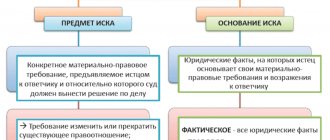Article updated: March 25, 2021
Alexey BessonovPracticing Moscow lawyer
Hello. I am a visiting lawyer from the Bessonov and Partners law firm. I help discharge citizens through the court. In this article I will describe instructions for owners who want to expel a stranger/stranger from their apartment.
To discharge any person without his consent, you will have to go to court and receive a positive court decision - clause 1 of Art. 35 LC RF and Art. 7 of the Law of June 25, 1993 N 5242-1. There are no other options.
Therefore, when an outsider refuses to check out on his own, ignores this requirement, or there is no contact with him, the owners need to draw up a statement of claim and submit it to the district court. All owners must inform the court about their desire to deregister the person, otherwise the claim may be rejected.
IMPORTANT : If a given citizen refuses to participate in the privatization of an apartment, the grounds for his discharge and the instructions themselves are very different. That’s why I have a separate article on how to discharge a person who refused to participate in privatization.
Is it possible to?
The law establishes that the citizen himself must , that is, this is a voluntary matter.
However, the legislation also provides for the forced termination of the right to use housing, or deregistration without his consent .
In most cases, this is done through the courts.
The owner is given the right to register and deregister people in the home he owns.
Therefore, only he can file a lawsuit. But the tenant of municipal housing can also apply as a representative of the owner, i.e. the municipality.
Court is a last resort. It is worth contacting him only when other methods have been exhausted. In addition, there must be good reasons for this.
Features of eviction of individuals
It is worth noting that eviction without consent is a very lengthy and labor-intensive process. If a person refuses to evict voluntarily, then only a court decision can force him to leave his place of registration. It will be much faster to reach an agreement with the tenant or owner before the start of the trial. If it is not possible to reach a consensus, the court of general jurisdiction will deal with the problem.
It is worth knowing that the state cares about children and disabled people, so it is quite difficult to forcibly evict, and depriving them of a place of residence is almost impossible. Regardless of whether the incapacitated person has rights to living space or not, removing him from registration will be very problematic.
Reasons
How to discharge a citizen in court? Let's consider the grounds for discharge without the consent of the discharged persons.
There are common grounds for appealing to the courts for privatized housing and for municipal ones.
How to eject a non-owner from an apartment without consent? The owner himself can only register the person who registered after the privatization of the housing .
People who lived in the apartment before privatization can only be discharged by the court. And from a municipal housing without the consent of a person, it is possible to cancel its registration only through a court decision. And nothing else.
Now the grounds are common to both forms of ownership:
- The citizen has rent arrears. Non-payment for more than 6 months (read about extracting from an apartment with debts).
- The person does not live in the home where he is registered for a long time.
- He has another apartment. That's where he lives.
- Uses the home for other purposes.
- They caused damage to the apartment.
- Unsanitary conditions. Does not follow hygiene rules.
- Hostile relationships.
- The tenant interferes with the lives of those around him. Is a bully or otherwise violates the rights of other residents.
- The contractual relationship (rent, hire, etc.) has ended.
- The citizen was registered in violation of registration rules.
- The house is in disrepair, dilapidated, and is subject to demolition.
Also find out on our website whether it is possible to discharge a convicted person, how to discharge a relative, and whether it is necessary to discharge a deceased person from an apartment.
There are more people who cannot be evicted from their apartment by the owner: new court decisions
For an apartment owner, the task of evicting “undesirable” tenants is now solved much easier: the one who has become a former family member for him loses the right to housing and, by a court decision, can be forcibly kicked out.
But, as often happens, it is impossible to apply one rule to all occasions. For example, refusal to participate in privatization gives the tenant the right to lifelong use of the apartment - so that, even after becoming a former member of the owner’s family, he is not subject to eviction even through the court.
Well, judicial practice has recently continued to be filled with new examples where the owner has failed to evict a tenant from his apartment. Let's look at who else could become such a problematic tenant.
Mother of a child who has nowhere to live
The divorce of parents does not affect the rights of the child - therefore he can continue to live in his father’s apartment, for example, since he remains a member of his family.
But his mother, who became the owner’s ex-wife, according to the law, loses the right to his apartment. But the situation may change if she does not have other housing, as well as the opportunity to purchase it.
Taking into account this and other circumstances, the court may reserve the mother’s right to use the apartment of her ex-spouse for a certain period of time (this is provided for in Part 4 of Article 31 of the Housing Code of the Russian Federation).
For example, the Kazan court refused to evict the ex-wife of an apartment owner until the child reaches 14 years of age. It was taken into account that the child’s father lives separately and is not involved in raising the child, but at the same time his apartment is the only housing for the child and his mother. And the mother’s income did not allow her to provide herself and the child with separate housing (Kirovsky District Court of Kazan, case No. 2-1809/19).
Completely bankrupt
Recently, more often decisions have been made that do not allow the new owner of a home to evict its previous owner and members of his family if the apartment was sold at auction for debts.
The law allows the debtor to be deprived of even his only home if it was the subject of a mortgage, and the bank failed to repay the loan.
However, in order not to drive a person out onto the street (especially when he has small children), the courts began to apply by analogy the previously mentioned norm of Part 4 of Art. 31 of the Housing Code of the Russian Federation and retain the right to use housing for the former owner for a certain period (usually from 6 months to 1 year).
Therefore, the one who purchased such an apartment is actually deprived of the opportunity to move into it during this time (for example, the decision of the Zainsky City Court of the Republic of Tatarstan in case No. 2-616/2019, the Amur City Court of the HC in case No. 2-1179/2019).
In general, according to the law (Article 95 of the Housing Code of the Russian Federation), such debtors should not be evicted to the street, but to municipal residential premises of the maneuverable fund. But, apparently, in the absence of this fund, the courts are forced to solve the housing problem of debtors at the expense of the new owners of such apartments.
Not a family member, but a “counterparty”
It will not be possible to apply the rule on the eviction of a former family member of the owner if the tenant was initially moved in on a different basis - in particular, under a civil contract (rent or free use of housing).
In this case, when deciding on eviction, the court will be guided not by the Housing Code of the Russian Federation, but by the terms of the concluded agreement and the Civil Code of the Russian Federation. Therefore, the owner will not always be able to win this dispute.
For example, in one case, which was considered by the court of St. Petersburg, the mother-in-law registered her daughter-in-law in her apartment on the basis of a rental agreement (apparently, not wanting to recognize her as a member of the owner’s family).
The law fully allows this: everyone except close relatives (these are children, spouse and parents) are recognized as members of the owner’s family only if he directly named them as such when moving in and registering (Part 1, Article 31 of the Housing Code of the Russian Federation).
But when, a few years later, the daughter-in-law became an ex and the mother-in-law wanted to evict her, she failed. The court recognized that the rental agreement they entered into is valid for another 5 years:
- since the rental period was not specified in the contract, then according to the law in this case the maximum permissible period of 5 years applies,
- and since the mother-in-law did not declare termination of the contract before the expiration of the first term, then it, again according to the law, is automatically extended for a new term.
Therefore, the court refused to evict the former daughter-in-law and recognized her right to use her mother-in-law’s apartment for another 5 years (Krasnoselsky District Court of St. Petersburg, case No. 2-1270/18).
VAT – 2022
The best speaker on tax topics, , will prepare you for filing your return on January 14 . There are 10 out of 40 places left for the online workshop . The flow is limited, as there will be live communication with the teacher live. Hurry up to get into the group. Sign up>>>
Causes
For legal proceedings and subsequent forced eviction, the reason may be, for example:
- divorce (read about deprivation of registration of an ex-husband and ex-wife);
- family relationships ended. For example, parents do not want to live with adult children;
- lack of common farming. The tenant or tenants do not participate in the maintenance of the apartment.
These same reasons may also serve as grounds for the homeowner to go to court.
You can learn about how to get discharged while in another city, whether it can be done by power of attorney, as well as through State Services or MFC, and what documents are required for discharge from our articles.
What residential address should be indicated in documents?
People often ask me, “I don’t know where the person who needs to be discharged lives now. What address should I indicate in the claim then? What if it is known? Should I indicate the actual one?
In the statement of claim, it is enough to indicate the defendant’s residential address, i.e. apartment from which he needs to be discharged. According to the logic of the courts, the defendant’s place of residence is his registration address - paragraph 63 of the Resolution of the Plenum of the Supreme Court of June 23, 2015 N25. The plaintiff is not required to know where the defendant actually lives.
As a result, all subpoenas will be sent to the defendant’s registered address - Art. 113 Code of Civil Procedure of the Russian Federation. If he does not receive them (because he does not live there), the court will still consider him notified. Receiving important correspondence is a citizen's responsibility, so everything is legal. If he does not appear in court, the case will still be considered without him (in absentia) - clause 4 of Art. 167 Code of Civil Procedure of the Russian Federation. This benefits the plaintiffs because the defendant will not be able to protect their interests.
Package of documents
To carry out forced eviction we will need:
- statement of claim;
- documents for housing. Lease, rental or social tenancy agreements, certificate of ownership;
- documents indicating the existence of grounds for eviction;
- certificate about those living in the home;
- witness's testimonies. That is, written (oral) evidence of the behavior of a citizen who violates the rules of community life.
How to declare an elderly person incompetent?
Every year, the guardian draws up a report on the expenditure of funds and submits it to the guardianship authorities. Let's consider how to recognize an elderly person as incompetent.
Recognition procedure Many do not know where to begin the procedure for recognizing an elderly person as incompetent. The following have the right to question a person’s legal capacity due to old age and submit a corresponding application to the court:
- relatives who live with a senior citizen in the same living space;
- brothers, sisters, children (registration will not matter);
- guardianship and trusteeship authorities (TBO);
- organizations that provide services to people with mental disabilities;
- other psychiatric medical institutions.
If the interested citizen is not one of the listed persons, then it will not be possible to quickly file a claim. First he has to contact the PLO.
Cost and terms
The state duty will be 200 rubles.
The claim can be sent to only one unwanted tenant. If there are several of them, then claims are made against everyone. A fee is payable for each individual claim.
In addition to the fee, the price will also include the cost of preparing copies of documents and notarization . Need to mark. that costs vary by region. Prices for services in each of them are different.
What are the deadlines? The court will accept the claim within 5 days . 1 - 2 months are allotted for its consideration . If the decision is not appealed, then the documents are submitted to the FMS office.
An extract based on the court decision will be issued within 14 days . True, it can drag on until 30 , but not later. This is the case. when a person discharges himself.
You will be given a departure slip and a passport with a note about deregistration.
Rules for drawing up and filing a claim for an extract
When filing a claim, you should take into account the jurisdiction corresponding to the district court serving the geographically located apartment. The application form for deregistration from an apartment includes:
- The header of the document indicating the details of the addressee - the district court with the exact name and legal address and personal data of the plaintiff indicating the location of the apartment and known information about the location of the defendant in case of absence from the disputed territory.
- The main narrative part describing the essence of the problem, the chronology of events regarding registration, the awareness of the resident by sending a written complaint and its subsequent ignoring, the need for discharge due to current circumstances, confirmed by documents and inviting witnesses to testify.
- The final part containing a request to satisfy the claim due to damage caused to the main tenant and other registered persons.
Samples of statements of claim for discharge from an apartment (by situation)
Statement of claim for the ex-husband's removal from the apartment: Sample application for removal from the apartment through the court. Blank (68.2 KiB, 5,196 hits)
Statement of claim to expel ex-husband from apartment. Blank (66.6 KiB, 2,044 hits)
Download samples: Sample claim for the discharge of a child through the court (18.9 KiB, 996 hits)
Claim for discharge from a municipal apartment (22.2 KiB, 656 hits)
Sample claim for ejectment from an apartment by a non-owner (23.6 KiB, 3,980 hits)
The form for a statement of claim for discharge from an apartment must contain a list of attachments of required documents. Partial copies are attached to the statement of claim, and the originals are presented in court proceedings.
Nuances and features
A child is discharged from municipal housing only with the permission of the guardian. If he is the owner of the apartment, then it will not be possible .
The owner can be written out only in one case, when he transfers ownership to another person .
The owner is obliged to provide the discharged citizen with equivalent housing if he does not have it (read about discharge to nowhere).
Debts must be repaid before discharge.
Otherwise, payment is the responsibility of the tenant or owner.
Cases when it is impossible to discharge a person
Initially, an illegal requirement to remove a person from an apartment can be in three cases.
- It is impossible to forcibly deregister the owner or co-owner of the property
And also a person who contributed at least part of the share for the cooperative apartment. The owner has the right not to live in the premises, but the right to use always remains with him.
- You cannot discharge a person if he is absent from the place of registration of residence for a valid reason
Example: It would be illegal to request a discharge from a person who is called up for military service or is temporarily absent due to study or treatment.
It is also impossible to deregister a person who is serving a sentence in a special institution for a crime, but other family members of the person remain registered in the apartment. If the specified circumstances cease to exist, then the person is deregistered after six months from the date of termination of the valid reason for absence.
- If such a condition is in the marriage contract
It is impossible to evict from a residential premises if a marriage contract has been concluded between the spouses. In its text there is a reference to the lifelong residence of the spouse on the square meters of the second. Only after the death of one of the spouses, the question of the discharge of the second spouse may arise if the new owner raises such a question.
- the rentee, if the living conditions are specified in the rent agreement.
Apartment of a mental patient when transferred to stumps
It indicates the reason why the incapacitated citizen should be deregistered. This document is sent to the guardianship and trusteeship authorities to obtain permission to discharge an incompetent citizen.
Moreover, an application is also drawn up during the process of registering a disabled person for a new place of residence, which is transferred to the local migration service.
- Applicant's passport. This document confirms the identity of the applicant and makes it possible to verify all data, including whether the applicant is the legal representative of an incapacitated citizen.
- A certificate or certificate confirming the fact of guardianship of a disabled person.
- Statement of claim to court.
It is submitted on behalf of the legal representative, indicating the details of the passport, certificate or certificate of the guardian and other relevant documents.








